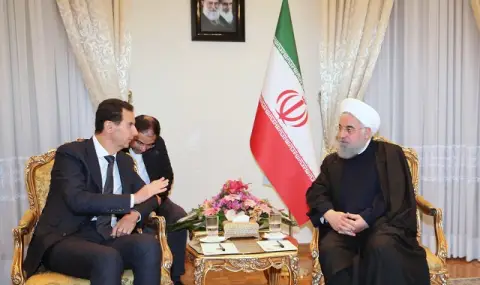Iran considered retaliating against Israel's April 1 attack from Syrian territory to the occupied Golan Heights. But Syrian President Bashar al-Assad refuses. This is what the Lebanese publication L'Orient-Le Jour.
claims
There is conflict between Bashar Assad and Iran before and after October 7. The Islamic Republic has increasingly come under fire from Israel in Syria, most notably the attack on Iran's consulate in Damascus on April 1 that killed Mohammad Reza Zahedi, a senior military official in Iran's Revolutionary Guards' Quds Force. However, the Syrian president refuses to take action.
L'Orient-Le Jour has learned from sources close to the "Axis of Resistance" that Assad opposes the idea of Iran retaliating from Syrian territory. When Iran was still considering its response against Israel, a major operation from Syrian territory to destroy Israeli military sites and infrastructure in the occupied Golan Heights was being considered, L'Orient-Le Jour learned from the same sources. Since a diplomatic mission was attacked on Syrian soil, it seemed logical that Iran would respond from Syrian soil. During discussions with Syrian officials, Tehran cited an operation to penetrate the occupied Golan Heights and the Syrian army retaking part of territory considered Syrian under international law. Assad, however, opposed this option.
The Syrian president, who wants to protect his regime from the war that has rocked the region since October 7, says such action cannot be carried out without close coordination with Russia, his other sponsor. Although he is still seeking to retake Idlib province from opposition forces, Assad believes any action from his territory would weaken the Syrian army on that front.
Suspicions and investigations
Although Tehran ultimately chose to retaliate from its territory on Saturday, the Syrian regime's refusal widened the existing gap between Damascus and Tehran since the start of Operation Al-Aqsa Flood. from October 7. The Syrian president has not forgotten that Hamas, supported by the Islamic Republic, supported the Syrian revolution, which was put down in blood. Faced with the principle of "united fronts" under the "Axis of Resistance", Assad received warnings from Israel and the US through various channels at the start of the Gaza war. The message was clear: if he decided to open the Syrian front to allow Tehran and its regional proxies to launch operations against Israel, retaliation would be directed at him personally and his regime would be overthrown. From that moment on, Assad stayed out of the war.
Iran's allies limited themselves to a few operations from southern Syria, to which Israel responded. Assad's refusal to allow Iran to retaliate from his territory reflects his desire to maintain this position to avoid a costly confrontation with the US or Israel. But Israel's strike on Tehran's consulate building in an affluent Damascus neighborhood has reignited Iranian suspicions that the regime may be cooperating with its enemies. In an effort to weaken the Iranian presence in Syria, Israel is targeting Iranian officials or their military deployment zones in Homs, near the Sayeda Zeinab neighborhood, in the southern suburbs of Damascus. In addition, he strikes them in the capital and border areas between Syria and Iraq, as well as Aleppo.
The increase in targeted killings attributed to Israel since October 7 has created suspicions between Syria and Iran. L'Orient-Le Jour has learned from the same sources that there have been numerous investigations into possible infiltration of the ranks of security officials in Syria - both before and especially after April 1 - which has led Assad to make changes to key positions. These changes have sparked debate among analysts. Some believe that Assad aimed to strengthen people close to Iran. Others saw it as marginalization in favor of figures close to Russia. On the political front, the Syrian president continues to cooperate with Moscow and Arab countries to stay out of the war. Despite his opposition to any Iranian retaliation from Syria, Assad stressed his commitment to maintaining good relations with Iran, citing the need for continued coordination.
